On The Front Lines
In countries where members of the LGBT+ community are systematically attacked, arrested, tortured and murdered, there are courageous activists who stand up to advance queer rights, sometimes at great personal cost. Here Stephen McCabe meets just six poweful individuals on the frontlines of the ight for a world of acceptance.
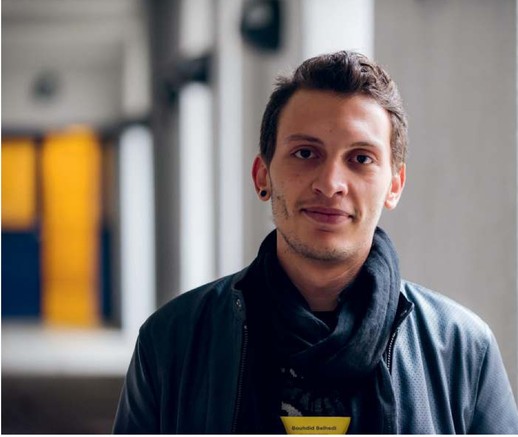
BOUHDID BELHEDI (Tunisia) LGBT HUMAN RIGHTS DEFENDER Association SHAMS (winner of GALAS International Award, 2017)
“ Forced anal testing is theoretically banned, but it is still a widespread practice throughout Tunisia.
“I was the first activist to appear on TV to talk about the LGBT situation in Tunisia. Following my appearances I received multiple threats from the government and also from extremists. I am no longer safe in my hometown, so thanks to a grant I was able to get rehoused.
Our organisation SHAMS is the only organisation to talk publicly about LGBT rights. As a result of our media activism we have begun to educate the Tunisian people about our struggle.
The main challenges Tunisian LGBT people face are Article 230 [of the Penal Code] which criminalises gay people, and the anal test for homosexuality. Forced anal testing is theoretically banned, but it is still a widespread practice throughout Tunisia. A person can refuse the anal test, but if you do, an inference will be drawn from that.
The Tunisian president has stated clearly that he is against abolishing Article 230 and all the deputies in our parliament are currently opposed to removing it. The only chance available to us is through the constitutional court, which is an independent institution.
Things have changed since the revolution. With the creation of SHAMS we can now publicly talk about our issues. We have won the freedom to express our opinion and the freedom to create associations like SHAMS, who talk about delicate subjects. But we have a lot more to achieve.
I recently called on the EU to stop all diplomatic and economic exchanges with Tunisia until Article 230 and the anal test are repealed. We work with other international organisations who help us to build pressure. It is very important to work at this level as the government is quite sensitive to how it’s perceived. The EU delegation in Tunisia is one of our partners and LGBT rights are one of their priorities. This is very encouraging.”
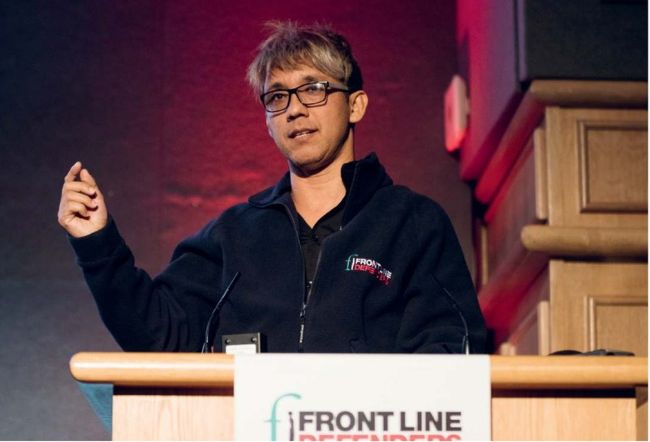
CALEB OROZCO (Belize) EXECUTIVE DIRECTOR United Belize Advocacy Movement (UNIBAM)
“ When they couldn’t progress their abortion agenda they came ater the LGBT community. They just needed a campaign to mobilise around.
“I first became an LGBT activist as a result of my work around HIV issues, which then evolved into setting up the United Belize Advocacy Movement in 2006. We engage with diplomatic systems and international organisations to achieve our goals for LGBT rights in Belize.
The local part of our work is legal research around issues which impact on LGBT people. We look at reforming discriminatory policies in the country. We also run a human rights observatory group and we document human rights abuses. There have been 356 human rights abuse cases in Belize since 1995, and of those over 50 were murders or attempted murders of members of our community.
In 2010 we filed a lawsuit to challenge the constitutionality of the sodomy laws in Belize. When the hearing for the decriminalisation case came up in 2013, I had to get security. Previously my car had been damaged and my property was invaded while I was sleeping. We won the case in 2016, athough an appeal is pending.
Originally the government decided that they would not be appealing the judgment, but then after protests they engineered a situation to allow the Catholic Church to have legal standing to appeal the decision.
Our engagement with local right wing groups didn’t start with the decriminalisation process; it started with abortion back in 2009. They were working towards sending our abortion laws into the dark ages. We fought back and we won on the ground, so when they couldn’t progress their abortion agenda they came after the LGBT community. They just needed a campaign to mobilise around.
At this point in Belize marriage equality is not a priority. We don’t even have basic things like job and education protection. For me it’s about building political voice that is visible and working from there.”
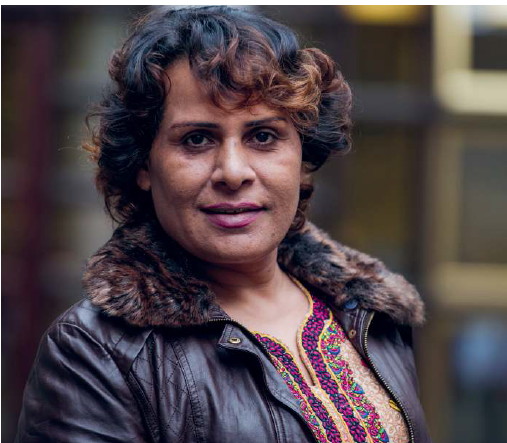
FARZANA RIAZ (Pakistan) PRESIDENT TransAction Alliance
“Between 2015 and 2017 there were 400 reports of abuse against trans people in Pakistan, much of which involves hair cutting. Sixty trans people have been killed in this period. A board member of my organisation was raped and her hair and eyebrows were cut. These types of abuses are common and are carried out by locals. When we go to report these incidents, the police often refuse to take the reports and rarely act on them when they do.
When trans people are injured from these attacks they are taken to hospitals, which refuse to admit them either in the male ward or the female ward. The hospital denied our board member admission and she died because of this.
We want to address all these issues but there are huge restrictions here and many challenges. When we worked with the local government, they faced threats from locals. Anybody who supports our work is being threatened by extremist and other political actors.
I got the first third gender passport issued because I went to court. I’m driven by the large number of trans people with nobody coming out to fight for us. Within our organisation we have 11 staff, but in the network we have 45,000 members. Many of our members have been shunned by their families and they are not getting education or other types of support, so this is a big priority of ours.
Our main focus for the future is to create employment so that trans people can lead normal lives. I plan to work on providing a building to house trans people who often face huge barriers to accessing housing.
By fighting we could get equal rights and the respect we deserve. Local, national and international media coverage can help by bringing our story to the masses.”
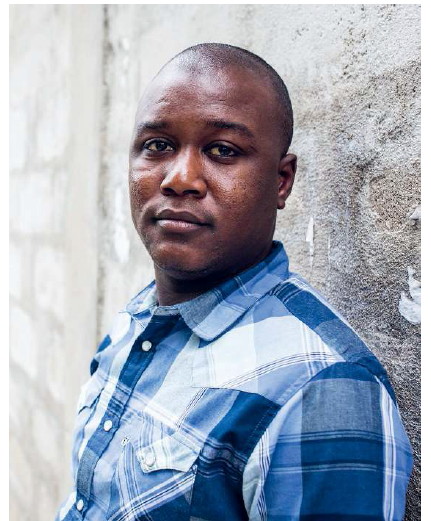
CHARLOT JEUDY (Haiti) PRESIDENT Kouraj
“The levels of discrimination we face in Haiti has a relationship to socioeconomic factors. LGBT people from less educated backgrounds are more likely to be discriminated against by their families. Families can be very religious and this can add an extra layer of misunderstanding and discrimination. It doesn’t mean that there is no discrimination among the more affluent parts of our society, but it’s less pronounced.
The main strategy of our organisation is to use communication to raise awareness within the wider population. The main media we utilise is social networks; traditional media doesn’t give us a voice. We have very popular social pages through which we raise awareness on different issues. We also provide legal assistance to the victims of transphobic and homophobic violence and raise awareness amongst our own community in regards to our rights to health.
It is extremely hard to get the general population in Haiti interested in our issues. When people cannot eat, don’t have proper shelter or can’t get their kids into school our rights are not a priority. The earthquake has also made our issues less important to the mainstream.
Human rights are not a buffet. though. You can’t pick and choose the rights you want to defend. Rights to food, shelter and accommodation are important, but so are our rights. Rights to health and housing need a big budget, whereas the right to respect needs political will. This is not here.
Promises made to improve our situation are seldom respected unless they serve the government’s political interests. I am proud that we are a well established organisation which couldn’t have existed ten years ago, and now more and more young people are interested in this movement. That makes me hopeful for the future.”
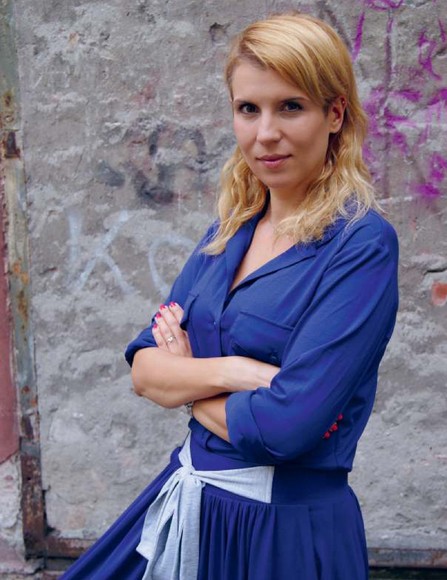
KAROLINA WIECKIEWICZ (Poland) HRD & SAFETY PROGRAMME COORDINATOR Lambda Warsaw Association
The current Polish government openly expresses negative attitudes towards gay people. The previous government tried to bring in legislation supposedly against paedophilia, but it was connected to their prejudice against gay people and this was an attempt to conflate the two.
The Catholic Church plays a huge role in perpetuating negative attitudes. They’re respected as a result of the role they played with Solidarity and the struggle, and successive governments are afraid of the church. The ruling party is now straightforward about the fact that they take their lead from the church on social issues. This is a huge problem.
Security has become an issue for us at Lambda, which is the oldest LGBT organisation in Poland. Last year there were a number of attacks on our office. We are always under the threat of physical attack and there are very limited protections available to us.
Poland has always had a problem with neo-Nazis and nationalism. When groups like these march through cities, they always demonstrate their hatred towards LGBT people. It’s really hard for the authorities to acknowledge that when our premises are attacked, these are not just property crimes; they are hate crimes.
The media is also problematic for us. The language they use about gay people and the stereotypes they employ are all part of the problem. We don’t have many journalists who truly get our cause. Sometimes their heart is in the right place but they are full of reductive language and often cover our issues in a clichéd way, which has a negative effect.
Gay men are more visible in Poland than lesbians and this is connected to gender issues. It’s easier for men to be out there and we have very few lesbian public figures. We are still not fully legally recognised in terms of marriage equality, we have a terrible trans legal framework, and we have a long way to go. But I am excited about the work we have to do.”
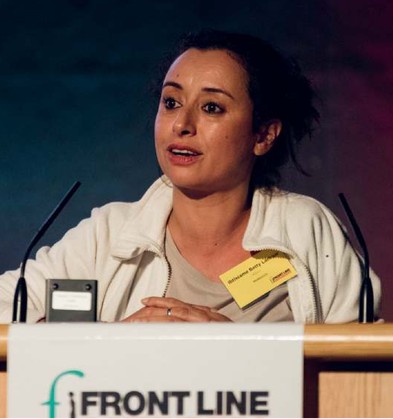
IBTISSAME LACHGAR (Morocco) CO-FOUNDER Mouvement Alternatif pour les Libertés Individuelles - Maroc
“As a heterosexual woman I am sometimes reproached by the LGBT community for my work in the LGBT sphere. I get some comments online saying I am useless to the cause. But by the same logic, does that mean that men shouldn’t fight for women’s rights or white people shouldn’t fight for minority rights?
In defending sexual rights it shouldn’t matter what you identify as. I criticise the society at large and its attitudes towards the gay community, but I am also a feminist who stages actions against the patriarchy. I would never speak for gay people. The focus is always on them to tell their stories.
We introduced the International Day Against Homophobia in Morocco in 2012. There was a visual campaign designed to generate maximum publicity. We all staged a mass kiss-in, which was widely covered.
During a campaign In 2014 I publicised the fact that I was living out of wedlock and having sexual relations with men, and I had a fatwa issued against me. I was also part of the 28th February movement, which came out of The Arab Spring to demand wider political reform within Morocco.
There are other groups here who protest against anti-gay legislation but their methods are not the same as ours. We like shock tactics and hard-hitting imagery alongside civil disobedience. Some people might think that these strategies are counterproductive. The way we highlight issues is designed to garner maximum attention. All our events are widely covered, sometimes in a negative way. But it is still a victory as it starts a conversation and debate, which is important.
The fact that I engage publicly in shock tactics with my face showing means that I am perhaps the least-liked activist in the country, both by the authorities and other more conservative activists. I have never been arrested specifically for my advocacy work. The authorities have always held me under spurious pretexts, making arbitrary arrests. When I was detained in 2016 I suffered police violence and sexual assault.”
The activists in this feature attended the Frontline Defenders Dublin Platform in October, 2017. To find out more about the work of Frontline Defenders visit
frontlinedefenders.org